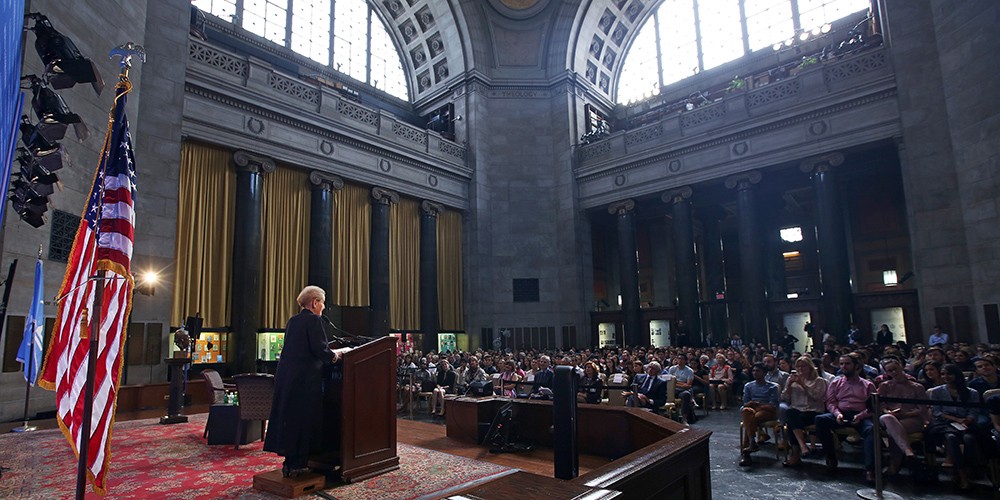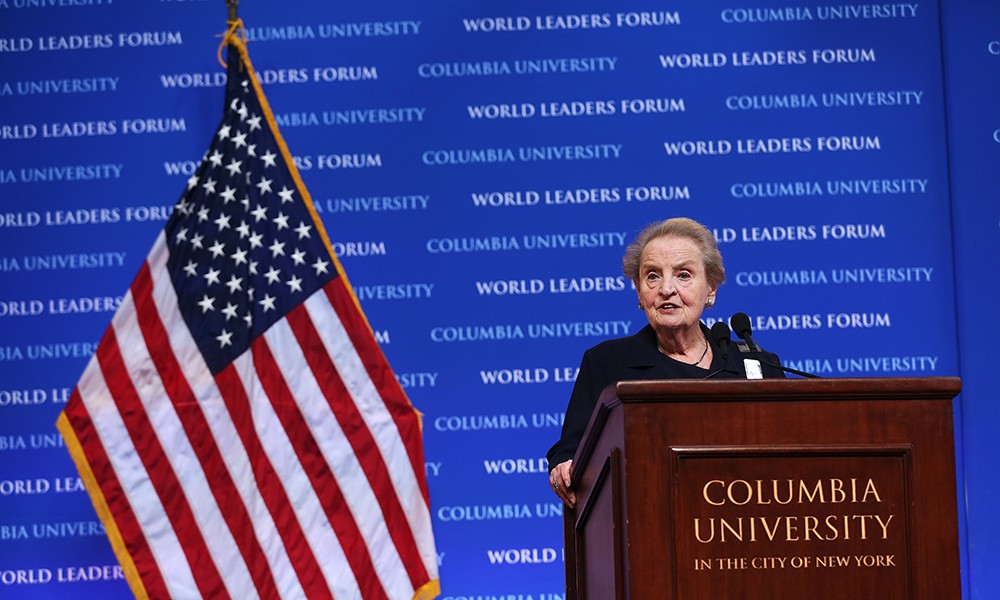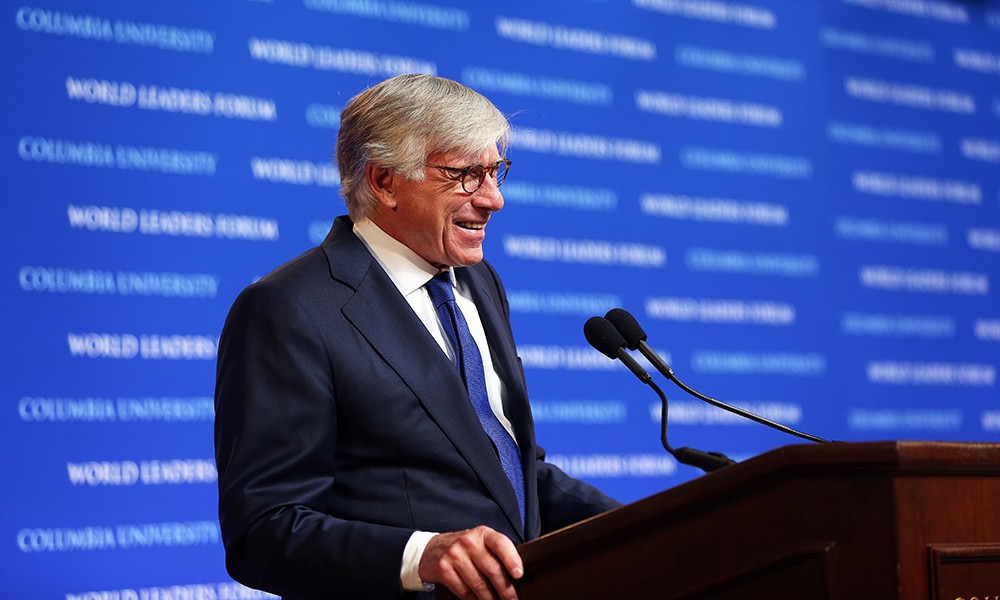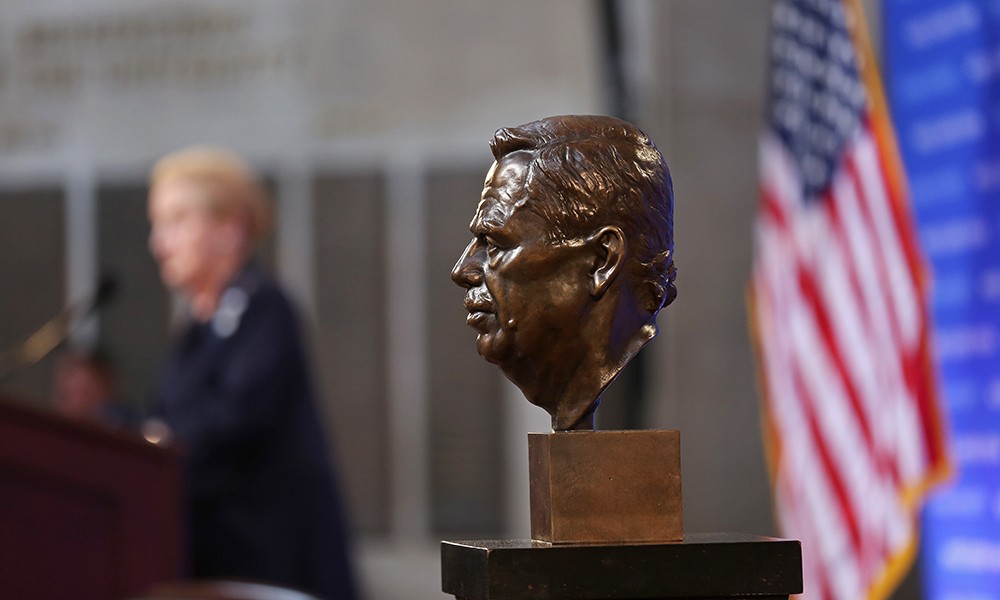September 27, 2018
One of the many privileges of being part of this very special University community is that we are afforded the opportunity—because of the greatness of Columbia, but also New York City—to consider, in a serious way, by inviting people, the people and ideas that have shaped the world for good and for bad. This is a particularly compelling instance of such a gathering. For there could be no better time to honor Václav Havel, and no better person than Madeleine Albright to pay tribute to Havel’s life and his legacy, and to tell us what she thinks.
Madam Secretary, thank you so much for returning to Columbia and for joining us today. Your personal experience, your life of diplomacy and public service, and the values you choose to defend so fiercely, make you one of Columbia’s most cherished alumnae.
Many of you here today remember when Václav Havel was at Columbia for a two-month residency in the fall of 2006, and the unique and wonderful experience that his presence on our campus provided for so many members of this University. It is hard to imagine that almost a dozen years have transpired. I want to try to make a few brief comments on how Havel came to Columbia.
In 2003, not too long after becoming Columbia’s President, I travelled to the Czech Republic to meet with Havel for the purpose of proposing that he consider spending an extended period of time at Columbia engaged in his scholarly and artistic interest Earlier that year, his decade of service as the Czech Republic’s first president had come to an end, and he was contemplating how to re-engage the world as an artist and writer. It was stunning to me to sit and talk with him for an hour or two, and to listen to him think about King Lear and about the transition of power from one source to another—the giving up of power. He said that he was eager to return to his roots.
This desire was fortuitous, as his roots extended to New York—and to Columbia. Havel’s first visit to New York took place in 1968, and he quickly developed a strong affinity for the city. Unfortunately, upon his return to Czechoslovakia, Havel’s passport was revoked, and it would be 22 years before he came back to the United States. When he returned, he did so as the recently elected President of a newly democratic Czechoslovakia. In those intervening years, he had helped to change the world.

That triumphal return to the U.S. in 1990, in the early days of his presidency, brought Havel to Columbia, where he received an honorary degree in a joyous ceremony that included his childhood friend, Milos Forman.
Against that backdrop, the idea of a Columbia residency following his time in politics was imbued with a pleasing symmetry. The purpose of the residency was to explore the relationship between art and citizenship. And who could have been a better guide or a more inspiring and revelatory leader in that exercise than Václav Havel? When his plays were staged, he joined in discussions of the performances. He spoke to classrooms and undergraduates. And I had the privilege of moderating a conversation between Václav Havel and President Clinton.
It is fitting, in this instance, to say that in this period we were graced by his presence, and now, by his bust.
There are many qualities associated with Václav Havel. People speak, of course, of his bravery and the fortitude to oppose the repression he confronted for so many years. There was his unyielding commitment to speaking the truth, regardless of the consequences. His profound belief in humanity’s potential for good. And, of course, his humility and his deep sense of honor—qualities that loom large especially at this moment and need to be celebrated and emulated.
In a sense, we are all waiting for Havel’s return.
Before inviting Secretary Albright to the podium, I simply want to say that she is the rare individual whose presence in our consciousness and in our public discourse has remained as strong today as it was during the eight years in which she served first as U.S. Permanent Representative to the United Nations, and then as President Clinton’s Secretary of State. Her voice continues to possess this power because she speaks to us with undeniable moral authority.
In her important new book, Fascism: A Warning, Secretary Albright writes that, when her father arrived in the U.S. following World War II, he worried that Americans were so accustomed to liberty that they might take democracy for granted.
Secretary Albright clearly has not fallen victim to that sort of complacency. She is among our very strongest defenders of the rights and welfare of refugees, and she has been blunt in warning about the danger posed by authoritarianism in all of its many forms.
Madame Secretary, we are eagerly looking forward to hearing you speak about Václav Havel, and the significance of his legacy during these trying times.
Please join me in welcoming Secretary Madeleine Albright.


